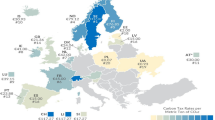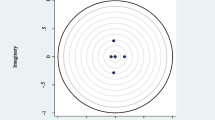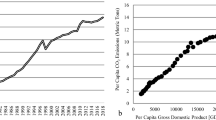Abstract
This study explores the impact of fiscal policy on environmental pollution, employing the vector autoregressive (VAR) model on annual data from 1976 to 2018 in Pakistan. We estimate the effect of total expenditure, total revenue, education expenditures, health expenditures, and other dynamic determinants such as gross domestic product (GDP), private investment, market rate, and crude oil price on carbon dioxide (CO2) emissions in particular. Further, this study creates impulse response functions to check the fiscal shocks, coordinating with five scenarios of public expenditures, segregated into government revenue, and education and health expenditures. The outcomes indicate that government spending in the public sectors (education and health) had a diminishing effect on CO2 emissions, whereas government revenue that was collected from taxes improved economic growth but at a cost of environmental pollution. In Pakistan, a fiscal policy scenario has been implemented that increases government expenditures to alleviate the effects of CO2 emissions. Therefore, policymakers should provide the right direction for the feasible distribution of resources in every public sector through a powerful structure, which will ultimately reduce the overall level of environmental deficit.




Similar content being viewed by others
Data availability
Available upon request
References
Angelopoulos K, Economides G, Philippopoulos A (2013) First-and second-best allocations under economic and environmental uncertainty. Int Tax Public Financ 20(3):360–380. https://doi.org/10.1007/s10797-012-9234-z
Arbolino R, Carlucci F, De Simone L, Ioppolo G, Yigitcanlar T (2018) The policy diffusion of environmental performance in the European countries. Ecol Ind 89:130–138. https://doi.org/10.1016/j.ecolind.2018.01.062
Bai J, Lu J, Li S (2019) Fiscal pressure, tax competition and environmental pollution. Environ Resource Econ 73(2):431–447. https://doi.org/10.1007/s10640-018-0269-1
Baiocchi G, Minx JC, Hubacek K (2010) The impact of social factors and consumer behavior on CO2 emissions in the UK: a panel regression based on input-output and geo-demographic consumer segmentation data. J Ind Ecol 14:50–72
Balsalobre-Lorente D, Ibáñez-Luzón L, Usman M, Shahbaz M (2021) The environmental Kuznets curve, based on the economic complexity, and the pollution haven hypothesis in PIIGS countries. Renew Energy (1–17): https://doi.org/10.1016/j.renene.2021.10.059
Barro RJ (1990) Government spending in a simple model of endogeneous growth. J Polit Econ 98(5 Part 2):S103–S125. https://doi.org/10.1086/261726
Bernauer T, Koubi V (2009) Effects of political institutions on air quality. Ecol Econ 68(5):1355–1365. https://doi.org/10.1016/j.ecolecon.2008.09.003
Brem A, Viardot E, Nylund PA (2021) Implications of the coronavirus (COVID-19) outbreak for innovation: which technologies will improve our lives? Technol Forecast Soc Chang 163:120451. https://doi.org/10.1016/j.techfore.2020.120451
Calbick KS, Gunton T (2014) Differences among OECD countries’ GHG emissions: causes and policy implications. Energy Policy 67:895–902. https://doi.org/10.1016/j.enpol.2013.12.030
Carlsson F, Lundström S (2001) Political and economic freedom and the environment: the case of CO2 emissions. Department of Economics, Goteborg University, Goteborg
Chishti MZ, Ahmad M, Rehman A, Khan MK (2021) Mitigations pathways towards sustainable development: assessing the influence of fiscal and monetary policies on carbon emissions in BRICS economies. J Clean Prod 292:126035. https://doi.org/10.1016/j.jclepro.2021.126035
Cole MA, Elliott RJ (2003) Determining the trade–environment composition effect: the role of capital, labor and environmental regulations. J Environ Econ Manag 46(3):363–383. https://doi.org/10.1016/S0095-0696(03)00021-4
Economides G, Philippopoulos A (2008) Growth enhancing policy is the means to sustain the environment. Rev Econ Dyn 11(1):207–219. https://doi.org/10.1016/j.red.2007.05.001
Ekins P, Summerton P, Thoung C, Lee D (2011) A major environmental tax reform for the UK: results for the economy, employment and the environment. Environ Resource Econ 50(3):447–474
Floyd JE (2005) Vector Autoregression Analysis: Estimation and Interpretation. University of Toronto, 6-11. https://www.economics.utoronto.ca/jfloyd/papers/varnote.pdf
Frederik C, Lundström S (2001) Political and economic freedom and the environment: the case of CO2 emissions. Department of Economics, Göteborg University. https://swopec.hhs.se/gunwpe/papers/gunwpe0029.pdf
Galinato GI, Islam A (2017) The challenge of addressing consumption pollutants with fiscal policy. Environ Dev Econ 22(5):624–647. https://doi.org/10.1017/S1355770X17000237
Grossman GM, Krueger AB (1995) Economic growth and the environment. Q J Econ 110(2):353–377. https://doi.org/10.2307/2118443
Gujarati DN (2009) Basic econometrics: Tata McGraw-Hill Education
Gupta MR, Barman TR (2009) Fiscal policies, environmental pollution and economic growth. Econ Model 26(5):1018–1028. https://doi.org/10.1016/j.econmod.2009.03.010
Halkos GE, Paizanos EΑ (2013) The effect of government expenditure on the environment: an empirical investigation. Ecol Econ 91:48–56. https://doi.org/10.1016/j.ecolecon.2013.04.002
Halkos GE, Paizanos EΑ (2016) The effects of fiscal policy on CO2 emissions: evidence from the USA. Energy Policy 88:317–328. https://doi.org/10.1016/j.enpol.2015.10.035
Halkos G, Paizanos E (2014) Exploring the effect of economic growth and government expenditure on the environment. https://mpra.ub.uni-muenchen.de/id/eprint/56084
Hua Y, Xie R, Su Y (2018) Fiscal spending and air pollution in Chinese cities: identifying composition and technique effects. China Econ Rev 47:156–169. https://doi.org/10.1016/j.chieco.2017.09.007
Ike GN, Usman O, Sarkodie SA (2020) Fiscal policy and CO2 emissions from heterogeneous fuel sources in Thailand: evidence from multiple structural breaks cointegration test. Sci Total Environ 702:134711. https://doi.org/10.1016/j.scitotenv.2019.134711
Intisar RA, Yaseen MR, Kousar R, Usman M, Makhdum MSA (2020) Impact of trade openness and human capital on economic growth: a comparative investigation of Asian countries. Sustainability 12(7):2930. https://doi.org/10.3390/su12072930
Islam AM, López RE (2013) Government spending and air pollution in the US, (No. 1667-2016-136314). http://dx.doi.org/10.22004/ag.econ.144406
Jahanger A, Usman M, Ahmad P (2021b) A step towards sustainable path: the effect of globalization on China’s carbon productivity from panel threshold approach. Environ Sci and Pollut Res: 1-16. https://doi.org/10.1007/s11356-021-16317-9
Jahanger A, Usman M, Balsalobre-Lorente D (2021a) Autocracy, democracy, globalization, and environmental pollution in developing world: fresh evidence from STIRPAT model. J Public Aff: e2753. https://doi.org/10.1002/pa.2753
Jenkins GP, Lamech R (1992) Fiscal policies to control pollution: international experience: Harvard Institute for International Development, (No. 5). Harvard Institute for International Development, Harvard University. http://jdintl.econ.queensu.ca/publications/qed_dp_98.pdf
Kamal M, Usman M, Jahanger A, Balsalobre-Lorente D (2021) Revisiting the role of fiscal policy, financial development, and foreign direct investment in reducing environmental pollution during globalization mode: evidence from linear and nonlinear panel data approaches. Energies 14(21):6968. https://doi.org/10.3390/en14216968
Khalid K, Usman M, Mehdi MA (2021) The determinants of environmental quality in the SAARC region: a spatial heterogeneous panel data approach. Environ Sci Pollut Res 28(6):6422–6436. https://doi.org/10.1007/s11356-020-10896-9
Khaliq F, Ahmed W (2018) Quality and Effectiveness of Public Spending on Education in Pakistan. State Bank of Pakistan 49.
Lee J, Jung I (2021) Instructional changes instigated by university faculty during the COVID-19 pandemic: the effect of individual, course and institutional factors. Int J Educ Technol High Educ 18(1):1–19. https://doi.org/10.1186/s41239-021-00286-7
López R, Galinato GI (2007) Should governments stop subsidies to private goods? Evidence from rural Latin America. J Public Econ 91(5–6):1071–1094. https://doi.org/10.1016/j.jpubeco.2006.10.004
López R, Palacios A (2014) Why has Europe become environmentally cleaner? Decomposing the roles of fiscal, trade and environmental policies. Environ Resource Econ 58(1):91–108. https://doi.org/10.1007/s10640-013-9692-5
López R, Galinato GI, Islam A (2011) Fiscal spending and the environment: theory and empirics. J Environ Econ Manag 62(2):180–198
Lütkepohl H (2013) Vector autoregressive models Handbook of Research Methods and Applications in Empirical Macroeconomics. Edward Elgar Publishing. https://elearning.unito.it/sme/pluginfile.php/262759/course/section/51114/Kilian_Handbook13.pdf
Manisalidis I, Stavropoulou E, Stavropoulos A, Bezirtzoglou E (2020) Environmental and health impacts of air pollution: a review. Front Public Health 8:14. https://doi.org/10.3389/fpubh.2020.00014
Morshed AM, Porna AK, Amin SB (2018) The Causal Relationship between Government Spending and Environmental Quality: The Case for Bangladesh. https://zantworldpress.com/wp-content/uploads/2018/07/8.-Muhib.pdf
Qader MR, Khan S, Kamal M, Usman M, Haseeb M (2021) Forecasting carbon emissions due to electricity power generation in Bahrain. Environ Sci Pollut Res: 1-12. https://doi.org/10.1007/s11356-021-16960-2
Raffin, N (2014) Education and the political economy of environmental protection. Annals of Economics and Statistics/Annales d'Économie et de Statistique (115/116): 379-407. https://doi.org/10.15609/annaeconstat2009.115-116.379
Usman M, Hammar N (2021) Dynamic relationship between technological innovations, financial development, renewable energy, and ecological footprint: fresh insights based on the STIRPAT model for Asia Pacific Economic Cooperation countries. Environ Sci Pollut Res 28(12):15519–15536. https://doi.org/10.1007/s11356-020-11640-z
Usman M, Jahanger A (2021) Heterogeneous effects of remittances and institutional quality in reducing environmental deficit in the presence of EKC hypothesis: a global study with the application of panel quantile regression. Environ Sci Pollut Res: 1-19. https://doi.org/10.1007/s11356-021-13216-x
Usman M, Makhdum MSA (2021) What abates ecological footprint in BRICS-T region? Exploring the influence of renewable energy, non-renewable energy, agriculture, forest area and financial development. Renewable Energy 179:12–28. https://doi.org/10.1016/j.renene.2021.07.014
Usman M, Khalid K, Mehdi MA (2021) What determines environmental deficit in Asia? Embossing the role of renewable and non-renewable energy utilization. Renewable Energy 168:1165–1176. https://doi.org/10.1016/j.renene.2021.01.012
Usman M, Makhdum MSA, Kousar R (2020) Does financial inclusion, renewable and non-renewable energy utilization accelerate ecological footprints and economic growth? Fresh evidence from 15 highest emitting countries. Sustain Cities Soc 65:102590. https://doi.org/10.1016/j.scs.2020.102590
Vasilev A (2019) Optimal fiscal policy with environmental tax and pollution abatement spending in a model with utility-enhancing environmental quality: lessons from Bulgaria. Macroecon Finance Emerg Mark Econ 12(1):24–35. https://doi.org/10.1080/17520843.2018.1522360
Weina D, Gilli M, Mazzanti M, Nicolli F (2016) Green inventions and greenhouse gas emission dynamics: a close examination of provincial Italian data. Environ Econ Policy Stud 18(2):247–263. https://doi.org/10.1007/s10018-015-0126-1
Yang B, Usman M (2021) Do industrialization, economic growth and globalization processes influence the ecological footprint and healthcare expenditures? Fresh insights based on the STIRPAT model for countries with the highest healthcare expenditures. Sustainable Production and Consumption 28:893–910. https://doi.org/10.1016/j.spc.2021.07.020
Yang B, Jahanger A, Usman M, Khan MA (2021) The dynamic linkage between globalization, financial development, energy utilization, and environmental sustainability in GCC countries. Environ Sci Pollut Res 28(13):16568–16588. https://doi.org/10.1007/s11356-020-11576-4
Zhu Q, Peng X (2012) The impacts of population change on carbon emissions in China during 1978–2008. Environ Impact Assess Rev 36:1–8. https://doi.org/10.1016/j.eiar.2012.03.003
Author information
Authors and Affiliations
Contributions
The idea of the original draft belongs to Kashif Abbass& Huaming Song. The introduction, literature review, and empirical outcomes sections are written by Kashif Abbass. Farina Khan, Muhammad Asif, and Halima Begum helped in data collection and data compiling, visualized data of observed variables Kashif Abbass & Huaming Song constructed the methodology section in the study. All the authors read and approved the final manuscript.
Corresponding author
Ethics declarations
Ethics approval and consent to participate
We confirmed that this manuscript has not been published elsewhere and is not under consideration by another journal. Ethical approval and informed consent are not applicable for this study.
Consent for publication
Not applicable
Competing interests
The authors declare no competing interests.
Additional information
Responsible Editor: Nicholas Apergis
Publisher’s note
Springer Nature remains neutral with regard to jurisdictional claims in published maps and institutional affiliations.
Rights and permissions
About this article
Cite this article
Abbass, K., Song, H., Khan, F. et al. Fresh insight through the VAR approach to investigate the effects of fiscal policy on environmental pollution in Pakistan. Environ Sci Pollut Res 29, 23001–23014 (2022). https://doi.org/10.1007/s11356-021-17438-x
Received:
Accepted:
Published:
Issue Date:
DOI: https://doi.org/10.1007/s11356-021-17438-x




